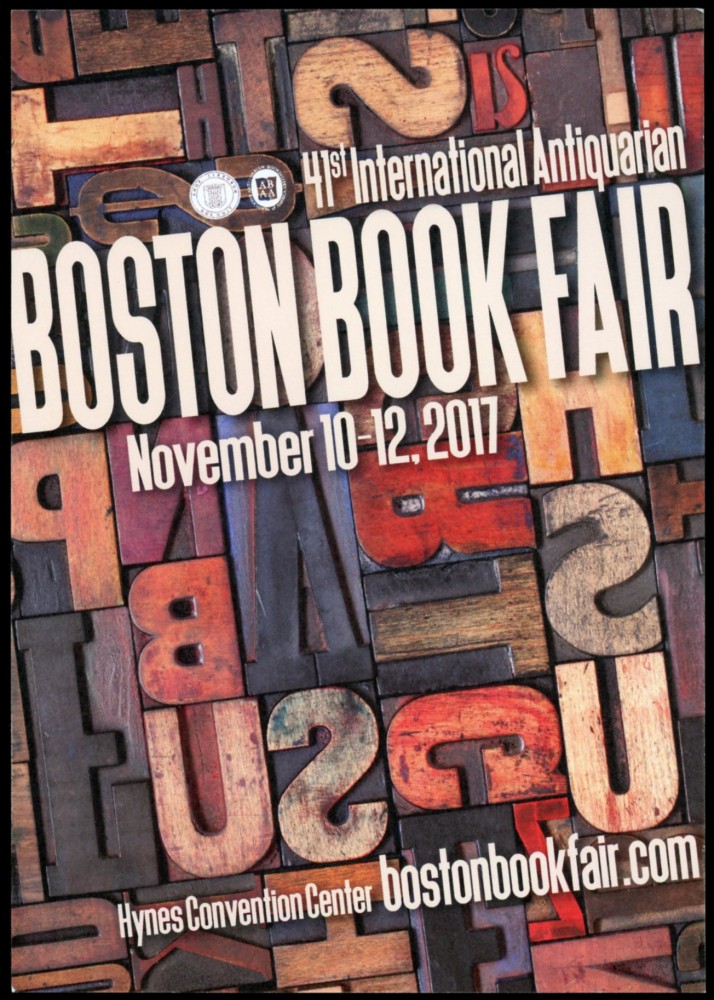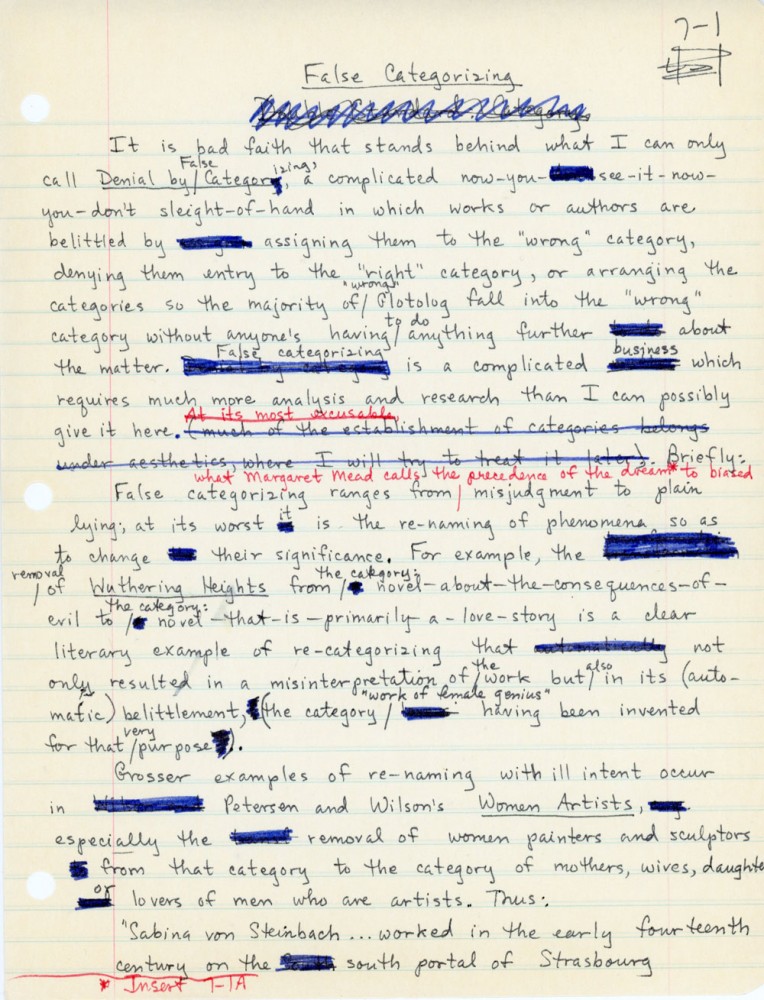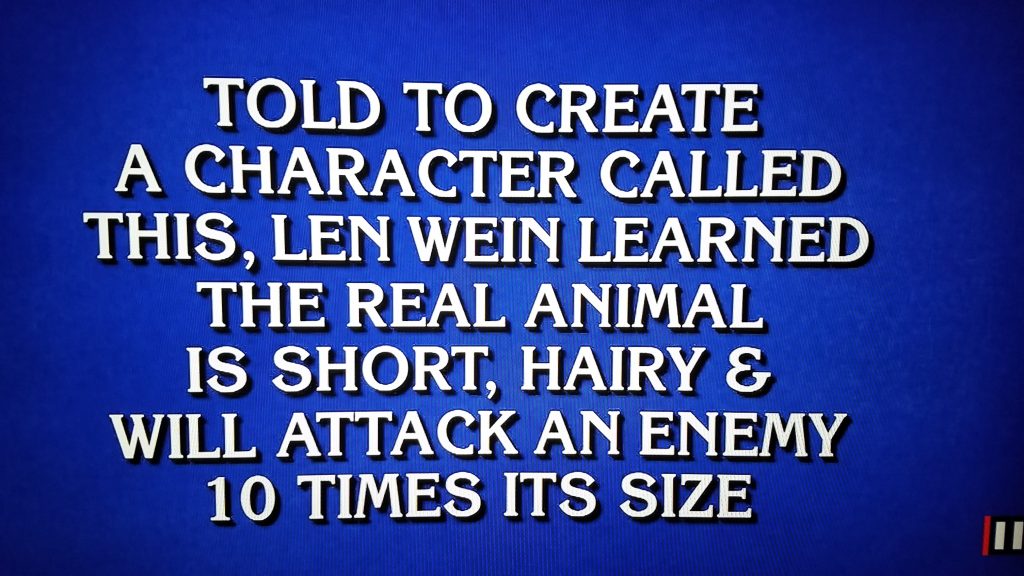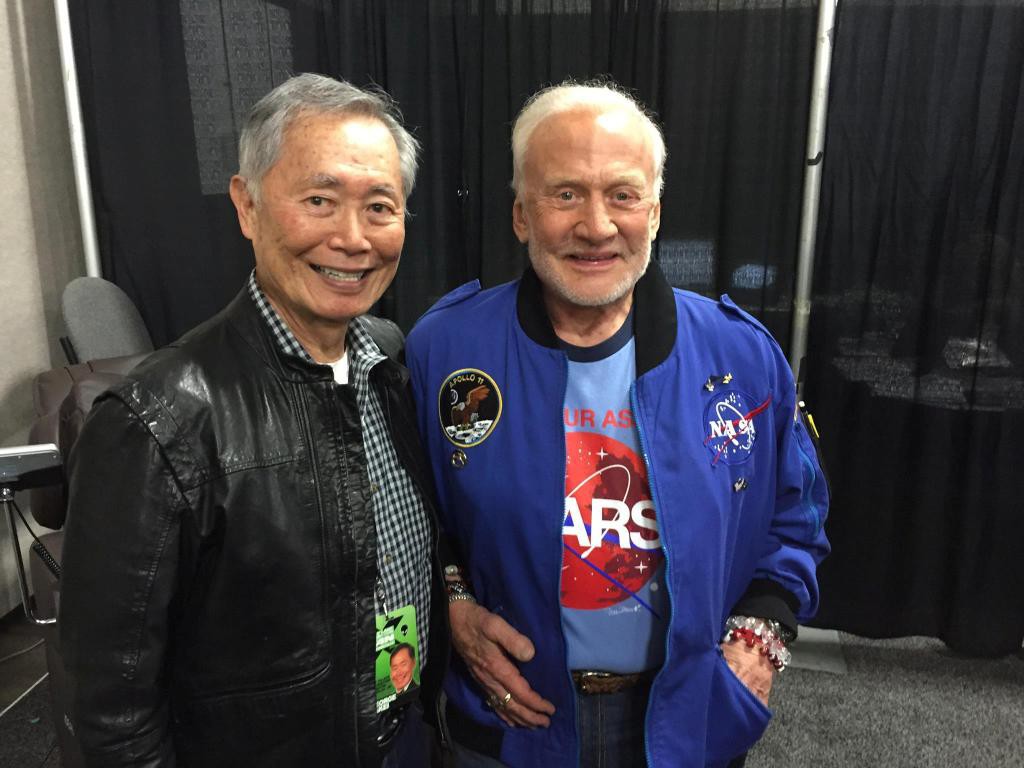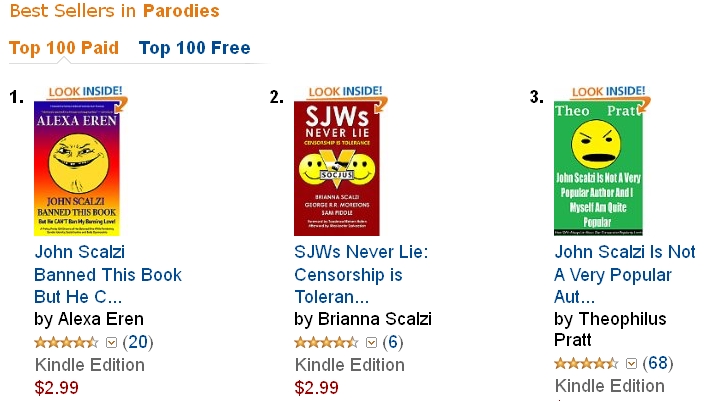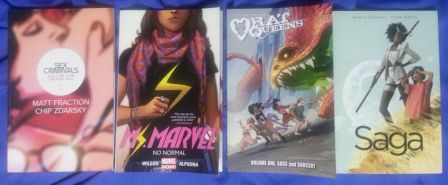aka Destination: Loon
Today’s roundup features Brad R. Torgersen, Paul Weimer, Vox Day, Edward Trimnell,John C. Wright, Barry Deutsch, N. K. Jemisin, Adam-Troy Castro, Jared Dashoff, Jason Sanford, Rebecca Luella Miller, Spacefaring Kitten, Melina D, Lis Carey, John Seavey, Rick Novy, Helena Bell and cryptic others. (Title credit goes to File 770 contributing editors of the day Kary English and Rev. Bob.)
Brad R. Torgersen on Mad Genius Club
“So you want to write an award-winning Hard Science Fiction story?” – June 21
[Begins with a series of insights about writing sf professionally.]
Now, for a few personal caveats. These are just my prejudices and biases speaking, so take ’em or leave ’em.
Endless polishing is death on productivity, and death on learning. I never learned anything from spending months or years tinkering with the same piece of work. Give yourself a personal rule, for when you’re going to stop on a specific work, and move on to something new. Either how many revisions you’ll do, or how much time you’ll devote to finishing touches once you’ve put THE END on the tail, etc. Just don’t get locked into thinking you can make any story perfect. I can speak from experience: good enough really is good enough.
Downbeat endings suck. They are ‘literary’ and some critics and aesthetes love them. But they suck. If you’re going to roast your characters in hell, at least give them a little silver lining at the end? Some kind of hope for a more positive outcome? Your readers will thank you.
Stories that demote humanity to being puny and insignificant, also suck. We may be small and/or not as advanced as other intelligent life in the universe, but we didn’t get to where we are now by being meaningless dullards. Humans are crafty and stubborn. Never say die. We should be reflected as such.
Some of the best HSF I’ve ever read, inspired in me the notion: Wow, this is how it could really happen! Be it space colonization, or warp drive, or first contact with another intelligent species from somewhere else in the galaxy. When you play by the rules — keeping the universe as we know it relatively intact, accessible, and consistent — you’re shining a light on a possible path. Not predicting the future per se, but illuminating a way that things might develop. That’s the kind of story that may inspire some teenager somewhere to become a rocket scientist.
Speaking of which, leave the “playground equipment” around for your readers to mess with. That’s a Niven-ism. If the reader gets to the end of your story and can imagine events continuing on — populated by your characters, the reader in character form, or both — then you’ve really won. Because you’ve made your world and your story so engrossing, the reader doesn’t want to leave! That’s a reader who will want to come back for more. That’s a reader who will be loyal, and tell others about your work.
Paul Weimer on Blog, Jvstin Style
“Campbell vs the New Wave, and Brad Torgersen” – June 22
I do think that Torgersen is missing a large bet on a lot of stories. And I am not sure that Literary=downbeat=suck is an equation that works. HEA and HFA are fine and dandy, but those aren’t the only stories. Hell, look at Stephen Baxter’s Xeelee stories as an excellent counter example. I’m sure Baxter would be surprised to be called literary. And he definitely does not suck.
What strikes me from this article is how it fights the whole Campbell vs the New Wave argument that I’ve opined was at the heart of the Sad Puppies.. One of the File 770 group called him Neo-Campbell. So there you have it.
Torgersen post shows that SF fandom and authors are STILL fighting the New Wave conflict, decades later. The past isn’t dead, its not even past.
Vox Day on Vox Popoli
“A necessary endorsement” – June 22
Refusing to take a side and trying to remain above it all will no more bring an end to the tactics he dislikes than the League of Nations prevented World War II. Misbehaving bullies can only be stopped with superior force. To stop the lynch mobs, Mr. Trimnell should help us bring them to an end by multiplying our force. We will abandon the tactic as soon as the SJWs do… like Ronald Reagan with the Evil Empire, we will trust, but verify. But until the SJWs give up their rhetorical tactics of name-calling, marginalization, and disqualification, we will continue play by the Chicago Rules and exploit every mistake they make and every opening they give us. The TOR boycott is nothing more than holding TOR Books accountable for the wholly unprofessional behavior of its SJW employees, behavior that would have gotten a minimum-wage Walmart greeter fired on the spot.
Furthermore, there is no symbiosis. The SJWs are not dependent upon anyone’s outlandish statements; if an opponent has not said something objectionable, they will simply lie and claim he did, then run their usual insult-isolate-disqualify routine. We, on the other hand, have a rich and continuously replenished pool of outlandish statements from which to choose to use against them.
Edward Trimnell
“Debating the Tor boycott” – June 22
I expressed my disagreement with Vox’s position on the Tor Books boycott…and Vox expressed his disagreement with my disagreement.
My dislike of boycotts remains.
I remember the mindless campaign orchestrated against Orson Scott Card a few years ago. Card’s sin was basically to express a view of marriage that was all but universal (including among liberals and Democrats) until ten years ago. Yet the SJW mobs did their best to silence Card, urging a nationwide boycott of the movie adaptation of Ender’s Game, and barraging the offices of DC Comics until Card was dropped from the company’s Superman project.
Ah, but that is exactly the point….say the forces behind the anti-Tor boycott. The SJWs do it.
I believe it is important to remember what separates the freethinkers from the SJWs. The freethinkers seek to outthink their opponents with a more persuasive argument in the marketplace of ideas.
The SJWs seek to silence their opponents through harassment and intimidation. (This should surprise no one, since the SJWs are almost all anti-market and anti-free speech.)
John C. Wright
“The Three Laws of Morlocktics” – June 22
[Quotes a long string of comments from File 770 but purports not to know the source, then says –]
The fear seems to be based on the grounds that her calling me and you neo-Nazi homophobic bigoted misogynist racists was cricket, but my accepting her lame apology like a gentleman (so she and I could get back to work) means that secretly I, and the other fine people called Sad Puppies who would like to reform the Hugo Awards, and return the award to be granted for merit of the work, rather than for the political correctness of the work, now have or may soon concoct an cunning yet dastardly plan!
The women who sound indistinguishable from phobia-afflicted delusional neurotic believe I and mine intend to send Daddy Warpig (the one Gamergater who expressed support for the Sad Puppies slate) to New York to blow up public monuments there with Vatican-made explosive rosaries, and dox and vox and vaporize Miss Gallo.
Because my expressions of neutrality and your letters to Tor asking for professional courtesy are so appallingly frightening that is creates an atmosphere of unsaferiffickness. Or something.
I would say that if women are that easily frightened, it is up to us men to make sure that no cad and no blackguard is ever allowed to speak to them. And if political argument over a pathetic space-yarn award gets the ladies this scared this quickly, it seemed that the Victorian standards for male and female roles were entirely correct. The poor, fainting, delicate damsels in distress must be keep safe from all the bumps and jars of the real world.
Either that, or these nags and termagants are a scandal and an embarrassment to their sex, because they are pretending to be frightened, when they are not, to arouse the very feelings of Victorian protective gentlemanliness that they at other times despise.
Which is it to be, ladies? Equality of the sexes in political matters? Or ultra-damsel-gushing, shriekingly school-girlish, play-pretend hysterical so beloved of the Left? The two are mutually exclusive.
Leftism or Equality?
Pick one.
N. K. Jemisin
“An open letter to the WSFS about unintended consequences” – June 22
Whoa. Did you guys think this through? No, seriously. Beyond whether “The Wheel of Time” could get a Hugo, or whether you, personally, like short fiction or not. Did you consider how proposal B.1.3 looks, both within and outside SFFdom? What message it sends about WSFS priorities? Consider the context. In a year when there’s been intense mainstream-media coverage of an attempt to ideologically tarnish the Hugo Awards, effectively making them less representative of the genre’s current dynamism and way more representative of racist white guys’ vanity publishing, this proposal compounds that problem. Let me break down how this looks to people outside of the WSFS process….
So let’s review. In a year when misogynists, white supremacists, and homophobes have already managed to use the Hugos to advance their own interests, along comes this proposal making it easier for privileged white men to gain recognition, at the direct expense of the marginalized. I’m going to assume it’s an unintended consequence that this proposal effectively reinforces the Puppies’ efforts; there’s been no reason to think that anyone on the WSFS is anything other than professionally neutral on the matter. Until now. So, c’mon ya’ll. Did you really think this through? Is this the best time for B.1.3? Are you really willing to throw short fiction under the bus just to give bestsellers another accolade? Do you mean to throw a level playing field under the bus, to give more affirmative action to successful white men?
Adam-Troy Castro
“Spaying the Hugos” – June 22
The proposal to simplify the Hugos by eliminating the Best Novelette category and replacing it with a Best Saga category is an excellent start, in large part because it will completely eliminate any interference with those fresh young talents who nobody is ever interested in and who just complicate things.
But it doesn’t go far enough. A few more appropriate changes would certainly help usher the awards into the twenty-first century.
First, eliminate the short story and novelette awards as well. As everybody keeps pointing out, the short fiction markets are dying and the annual competition for an award not supported by the free market is unseemly. Short fiction has never produced anything of worth, anyway. Name just one time it has. I bet you can’t.
Make the contest all about novels, the big awards that really mean something, and make the smallest award the one for best stand-alone novel, because everybody also knows that stand-alone novels are for writers with no staying power…..
Over the years, long fiction in the greater speculative fiction category has moved towards publishing works in series, rather than stand-alone works. Stand-alone works are still published and are eligible for Hugos in various categories, but some of us thought that the expansive works, where the individual volumes may or may not stand alone and be worthy of a Hugo themselves, deserved recognition. So we set out to create a Hugo for them. Best Saga became the title mostly because as the work gets longer, the title of the Hugo gets shorter.
Having attended many WSFS Business Meetings between us, and personally having been on the Head Table before and being on it this year, we felt the sense of the Meeting (i.e. how many that generally attend the Meeting feel) was that another professional fiction category would throw off the balance if a category was not removed. Based on long discussions and floating the idea past folks, we settled on the Novelette category. This bumped up the maximum word count for a short story, and dropped down the minimum word count for a Novella. No work that had been eligible was no longer eligible, it was just eligible in a different category….
In response to this opposition to the Novelette collapse, we contacted Kevin Standlee, Chair of the Sasquan Business Meeting, to ensure we could amend our proposal so long as it was before the deadline for the submission of New Business. We are now in the process of doing that and amending the discussion text to remove any reference to the Novelette collapse. Some original proposers have decided not to join us in this effort.
Going forward, the proposal will only include the addition of the Saga Hugo and that will need to pass or fail on its own merits. If it fails, we will be sad, but we accept that it was not the Business Meeting’s want to create an award for such works. If others wish to submit a proposal related to the shorter fiction works, that is their prerogative, but I will not be submitting one nor supporting it.
https://twitter.com/jasonsanford/status/612748644379267072
Rebecca Luella Miller on Speculative Faith
“Awards And The Problems Behind Them” – June 22
The irony of the brouhaha is that the Puppies seem to be arguing against the politicizing of science fiction and it’s preeminent award by politicizing the method used to select the award winners.
Having been behind the scenes for the Clive Staples Award in the past, I know a good deal about the ways people try to game the rules in order to help those they hope will win. One reason CSA instituted judging the short list—the finalists—by a panel of qualified judges was to avoid this kind of deck-stacking which would reduce the award intended to honor good writing and storytelling to a popularity contest (or a philosophical statement).
Yes, there are diversities among Christian writers, and some would push the point by “gaming” an award if they could.
Other awards have bypassed readers altogether in order to steer away from the popularity contest approach (come vote for my book even though you haven’t read it, just because you know me, sort of). But those are susceptible to other problems—unqualified first round judges, high entry fees, sponsoring organization promotion requirements, poorly conceived judging sheets, and the like.
In short, no award is likely to be perfect, but one that combines readers’ choice with qualified judging evaluations seems as if it has a better chance of honoring the year’s best book.
The Hugos? Seems to me they have gone the way of the Oscars and in the process have opened the door to a horrible mess. This long-running award is in the process of making itself irrelevant to readers.
The Clive Staples Award, on the other hand, is a tool which can help readers learn about the books that other readers value.
Spacefaring Kitten on Spacefaring Extradimensional Happy Kittens
“Kitten/Puppy Dialogues (on Pizza)” – June 22
In the comments to the last Wednesday’s post titled Answering Peter Grant, a Puppy supporter called Xephon has been vocally criticizing me for several things I’ve said. The arguments in his/her first few short comments made little sense to me, so I thought the discussion was going nowhere, but then this lengthy account landed on the comment section.
I’m still unconvinced, but Xephon brings up some points I want to respond to, and because this is going to take up some space, I’ll rather do it in a new post.
The sickening truth is that the anti-Puppies need Beale more than the Puppies do. He’s done nothing for my side except stir an increasingly rancid pot. Those of us who have distanced ourselves have learned that we are wasting our time, because all we hear from the other side is, “because Vox Day”. You need him to be your bogeyman, the focal point for your opposition. If he didn’t exist, someone would have invented him.
One of the funnies recent developments in the discussion around Hugos is that the second you mention Theodore Beale/Vox Day, somebody charges in and accuses you of “because Vox Day” fallacy. It sure is an interesting variant of “playing the ‘Playing the Hitler Card’ card”. Let me state once again that Beale’s Rabid Puppies slate swept the Hugo ballot. Your demand that everything related to him should be removed from the Hugo discussions does feel a bit odd — especially when we’re talking about his boycotts and other schemes.
Anony-Mouse on Cedar Writes
“Get out and Vote!” – June 22
Do NOT vote NO AWARD for anything. Yes, I know the temptation to make a statement by putting something below No Award at the bottom, but in the unlikely case of close races NA can have an adverse affect on outcomes because it’s a weighted ballot. And frankly, it’s a pet peeve of mine. NO AWARD is a political statement, and this isn’t supposed to be about naked politics.
Do NOT vote at all for anything you do not think is worthy, regardless of why you do not find it worthy. See previous.
DO try to vote for at least one good thing in each category rather than leaving the category blank. For example, some of the fanzine/semiprozine entries have been nothing but contemptuous of dissidents against the establishment. I will not vote for them. Others have been accepting of everyone, I will rank them.
World of Pancakes
“Retraction regarding the Sad Puppy John C. Wright” – June 22
I don’t do this sort of thing very often, but I’m retracting my last post. Let me explain why. In repose to charges of homophobia, Wright said the charges were a lie and responded in a fashion which could be described as equally “homophobic” and “bizarre.” I wrote a long-ish piece taking him to task for this. It’s a solid bit of work, but I’d like to disavow it as of now. Since posting this piece, I’ve read a good deal more of what Wright has written outside of his novels. I’ve come to the conclusion that Mr. Wright has enough going on his life that piling on like this is neither fair nor necessary. I stand by the content of what I wrote, but, given Mr. Wright’s situation, it was needlessly mean of me to write it.
Melina D on Subversive Reader
“Hugos 2015 Reading: Best Graphic Story” – June 22
[Reviews 4 of 5 nominees.]
It was so wonderful to read a category and understand why all the nominees (that I could access) were nominees. These had quality story telling, good art (and art telling stories which I appreciate so much), interesting plots and characters, character development, humour, and in some cases, extreme ‘feelings’. These are the things I want in all my fiction (except the art, of course) and they’re never restricted to one ‘type’ or ‘style’ of fiction – romance fiction can deliver these things as well as epic fantasy, historical fiction as well as apocalyptic fantasy.
When you hold the quality of this category – just the writing and story telling to start with – up against the others, you really see how bad most of the work in the short fiction and related fiction categories are. And you have to ask why? Why didn’t the slate people put forward work that is well written and engaging? (Or more of that work?) Is there a lack of well written and engaging work which is action oriented/classic age/milSF? Is there a publicity issue for works that are well written and action oriented/reminiscent of older stuff and? Or did this slate become a cynical/destructive force designed to reward certain writers/publishers while ‘punishing’ others?
Lis Carey on Lis Carey’s Library
“Beneath Ceaseless Skies, edited by Scott H. Andrews” – June 22
This is a 2015 Best Semiprozine Hugo nominee. Beneath Ceaseless Skies is an online magazine of literary adventure fantasy. It’s visually attractive, and it offers some impressive fantasy fiction. I was pleased to find an archive that allowed me to check out the 2014 issues, the relevant issues for this year’s Hugos. An extra delight is that it offers audio fiction as well as print. This is an altogether fine magazine, and I’m very impressed.
Reading SFF
“2015 Hugo Awards Reading: Cixin Liu – The Three-Body Problem (2008/2014)” – June 22
I liked that the novel posed lot’s of mysterious questions and even answered them in a way that made sense, at least most of the times. While there are a lot of things in this novel that I liked a lot, there are a few things that I did not like as much. Mainly, this is not a character driven novel. This novel is about the science, not the characters. It’s very hard SF (which is fine), but it’s so hard, that at times whole passages read as if they were taken from a popular science text-book on futuristic physics. I guess it’s difficult to have everything: an imaginative and engaging story, cool science and great characters. The Three-Body Problem scores 2 out of 3 of these, which is a very good score.
John Seavey on Fraggmented
“Review: Ancillary Justice” – June 22
I think that’s why, despite appreciating ‘Ancillary Justice’, I didn’t really enjoy it all that much. There is a plot, and it’s actually a very clever one. But Leckie takes a lot of time in getting to it; she’s got a lot to say about the Radch, the empire that controls vast segments of the galaxy, and she wants you to really get a handle on the reality of living in the empire they’ve created. Vast chunks of the novel are taken up explaining customs, linguistics (yes, including the bit the book is famous for, that the default gender is “she”) and politics of the Radch, long before the plot ever kicks into gear.
Rick Novy on Entropy Central
“Lampooning the Hugo Awards – Free Short Story” – June 22
aka…The Bluegills, the Bream, and the Shiny Stones
Every once in a while, a writer will produce a piece of fiction with a short shelf-life. Such it is with a story i wrote a couple of months ago. The intention was to make a statement about the 2015 Hugo Awards, so I lampooned it. I shopped the story to three pro markets that I thought might be able to handle the expiration date. One market called it amusing but not right for the magazine. I happen to agree it’s amusing, and the editor is probably right about it not being a good fit.
I decided the shelf life of the story is now way too short to try to sell the story again, so I’m posting it here for free. I hope you enjoy it.
Without further ado…


